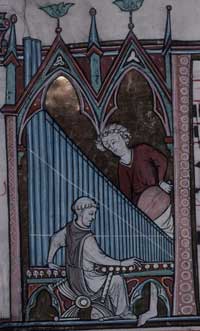 |
 |
 |
 |
 |
 |
 |
|
Music (1/2)
Where, I ask, do all these organs in the church come from, all these chimes? To
what purpose, I ask you, is the terrible snorting of bellows, more like a clap of thunder than the sweetness of
a voice? [Aelred of Rievaulx <read more>] The Cistercians
ruled against musical embellishment and strove to keep the chant
as simple as
possible, to ensure devotion and guard against frivolity. The General
Chapter prescribed that monks should sing in manly voices without
frills and trills, which were distracting
and vain. In the mid-twelfth century Aelred
of Rievaulx vehemently
denounced musical embellishments. In a colourful invective
he criticised the ‘swelling
and swooping’ of voices, the ‘din of bellows and the humming
of chimes’, and argued that far from enhancing religious
observance, these histrionic displays and ‘saucy gestures’ made
a mockery of worship. Aelred stressed that sound was of secondary
importance and should merely augment the meaning (read
more). To ensure that music was kept as simple as possible the General Chapter prohibited organs in Cistercian churches until 1486. This ban was not heeded everywhere, for the earliest surviving organ music, which comes from Robertsbridge in Sussex, dates from c. 1350 and the abbey of Meaux in Yorkshire had two organs in the fourteenth century. (10) |
||
|
